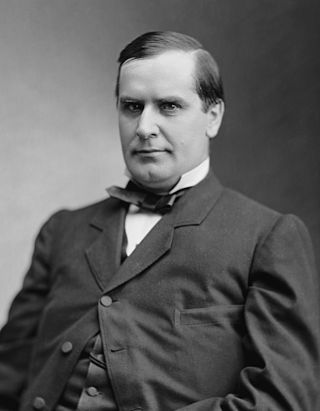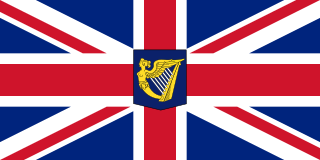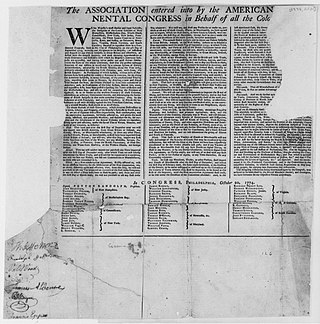
Calico is a heavy plain-woven textile made from unbleached, and often not fully processed, cotton. It may also contain unseparated husk parts. The fabric is far coarser than muslin, but less coarse and thick than canvas or denim. However, it is still very cheap owing to its unfinished and undyed appearance.
A tariff is a tax imposed by the government of a country or by a supranational union on imports or exports of goods. Besides being a source of revenue for the government, import duties can also be a form of regulation of foreign trade and policy that taxes foreign products to encourage or safeguard domestic industry. Protective tariffs are among the most widely used instruments of protectionism, along with import quotas and export quotas and other non-tariff barriers to trade.
The Tariff Act of 1789 was the first major piece of legislation passed in the United States after the ratification of the United States Constitution. It had two purposes: to protect manufacturing industries developing in the nation and to raise revenue for the federal government. It was sponsored by Congressman James Madison, passed by the 1st United States Congress, and signed into law by President George Washington. The act levied a 50¢ per ton duty on goods imported by foreign ships; American-owned vessels were charged 6¢ per ton.

The Tariff Act of 1890, commonly called the McKinley Tariff, was an act of the United States Congress, framed by then Representative William McKinley, that became law on October 1, 1890. The tariff raised the average duty on imports to almost 50%, an increase designed to protect domestic industries and workers from foreign competition, as promised in the Republican platform. It represented protectionism, a tactic supported by Republicans and denounced by Democrats. It was a major topic of fierce debate in the 1890 Congressional elections, which gave a Democratic landslide.

The Corn Laws were tariffs and other trade restrictions on imported food and corn enforced in the United Kingdom between 1815 and 1846. The word corn in British English denoted all cereal grains, including wheat, oats and barley. They were designed to keep corn prices high to favour domestic producers, and represented British mercantilism. The Corn Laws blocked the import of cheap corn, initially by simply forbidding importation below a set price, and later by imposing steep import duties, making it too expensive to import it from abroad, even when food supplies were short. The House of Commons passed the corn law bill on 10 March 1815, the House of Lords on 20 March and the bill received royal assent on 23 March 1815.

Southern Ireland was the larger of the two parts of Ireland that were created when Ireland was partitioned by the Government of Ireland Act 1920. It comprised 26 of the 32 counties of Ireland or about five-sixths of the area of the island, whilst the remaining six counties, which occupied most of Ulster in the north of the island, formed Northern Ireland. Southern Ireland included County Donegal, despite it being the largest county in Ulster and the most northerly county in all of Ireland.
The Navigation Acts, or more broadly the Acts of Trade and Navigation, were a long series of English laws that developed, promoted, and regulated English ships, shipping, trade, and commerce between other countries and with its own colonies. The laws also regulated England's fisheries and restricted foreign—including Scottish and Irish—participation in its colonial trade. While based on earlier precedents, they were first enacted in 1651 under the Commonwealth.

The Ministry of Agriculture, Fisheries and Food (MAFF) was a United Kingdom government department created by the Board of Agriculture Act 1889 and at that time called the Board of Agriculture, and then from 1903 the Board of Agriculture and Fisheries, and from 1919 the Ministry of Agriculture and Fisheries. It attained its final name in 1955 with the addition of responsibilities for the British food industry to the existing responsibilities for agriculture and the fishing industry, a name that lasted until the Ministry was dissolved in 2002, at which point its responsibilities had been merged into the Department for Environment, Food and Rural Affairs (Defra).

The Townshend Acts or Townshend Duties were a series of British acts of Parliament passed during 1767 and 1768 introducing a series of taxes and regulations to fund administration of the British colonies in America. They are named after the Chancellor of the Exchequer who proposed the programme. Historians vary slightly as to which acts they include under the heading "Townshend Acts", but five are often listed:

The Sugar Act 1764 or Sugar Act 1763, also known as the American Revenue Act 1764 or the American Duties Act, was a revenue-raising act passed by the Parliament of Great Britain on 5 April 1764. The preamble to the act stated: "it is expedient that new provisions and regulations should be established for improving the revenue of this Kingdom ... and ... it is just and necessary that a revenue should be raised ... for defraying the expenses of defending, protecting, and securing the same." The earlier Molasses Act 1733, which had imposed a tax of six pence per gallon of molasses, had never been effectively collected due to colonial evasion. By reducing the rate by half and increasing measures to enforce the tax, Parliament hoped that the tax would actually be collected. These incidents increased the colonists' concerns about the intent of the British Parliament and helped the growing movement that became the American Revolution.

The Tea Act 1773 was an Act of the Parliament of Great Britain. The principal objective was to reduce the massive amount of tea held by the financially troubled British East India Company in its London warehouses and to help the struggling company survive. A related objective was to undercut the price of illegal tea, smuggled into Britain's North American colonies. This was supposed to convince the colonists to purchase Company tea on which the Townshend duties were paid, thus implicitly agreeing to accept Parliament's right of taxation. Smuggled tea was a large issue for Britain and the East India Company, since approximately 86% of all the tea in America at the time was smuggled Dutch tea.

The Continental Association, also known as the Articles of Association or simply the Association, was an agreement among the American colonies adopted by the First Continental Congress in Philadelphia on October 20, 1774. It was a result of the escalating American Revolution and called for a trade boycott against British merchants by the colonies. Congress hoped that placing economic sanctions on British imports and exports would pressure Parliament into addressing the colonies' grievances, especially repealing the Intolerable Acts, which were strongly opposed by the colonies.

The Suffolk Resolves was a declaration made on September 9, 1774, by the leaders of Suffolk County, Massachusetts. The declaration rejected the Massachusetts Government Act and resulted in a boycott of imported goods from Britain unless the Intolerable Acts were repealed. The Resolves were recognized by statesman Edmund Burke as a major development in colonial animosity leading to adoption of the United States Declaration of Independence from the Kingdom of Great Britain in 1776, and he urged British conciliation with the American colonies, to little effect. The First Continental Congress endorsed the Resolves on September 17, 1774, and passed the similarly themed Continental Association on October 20, 1774.
The Anglo-Irish Trade War was a retaliatory trade war between the Irish Free State and the United Kingdom from 1932 to 1938. The Irish government refused to continue reimbursing Britain with land annuities from financial loans granted to Irish tenant farmers to enable them to purchase lands under the Irish Land Acts in the late nineteenth century, a provision which had been part of the 1921 Anglo-Irish Treaty. This resulted in the imposition of unilateral trade restrictions by both countries, causing severe damage to the Irish economy.
Tariffs have historically served a key role in the trade policy of the United States. Their purpose was to generate revenue for the federal government and to allow for import substitution industrialization by acting as a protective barrier around infant industries. They also aimed to reduce the trade deficit and the pressure of foreign competition. Tariffs were one of the pillars of the American System that allowed the rapid development and industrialization of the United States. The United States pursued a protectionist policy from the beginning of the 19th century until the middle of the 20th century. Between 1861 and 1933, they had one of the highest average tariff rates on manufactured imports in the world. However American agricultural and industrial goods were cheaper than rival products and the tariff had an impact primarily on wool products. After 1942 the U.S. promoted worldwide free trade.

The Molasses Act 1733 was an Act of the Parliament of Great Britain that imposed a tax of six pence per gallon on imports of molasses from non-British colonies. Parliament created the act largely at the insistence of large plantation owners in the British West Indies. The Act was passed not to raise revenue but to regulate trade by making British products cheaper than those from the French West Indies. The Act greatly affected the significant colonial molasses trade.

The Boston Tea Party was an American political and mercantile protest on December 16, 1773, by the Sons of Liberty in Boston in colonial Massachusetts. The target was the Tea Act of May 10, 1773, which allowed the British East India Company to sell tea from China in American colonies without paying taxes apart from those imposed by the Townshend Acts. The Sons of Liberty strongly opposed the taxes in the Townshend Act as a violation of their rights. In response, the Sons of Liberty, some disguised as Native Americans, destroyed an entire shipment of tea sent by the East India Company.

The Royal Malaysian Customs Department is a government department body under the Malaysian Ministry of Finance. RMCD functions as the country's main indirect tax collector, facilitating trade and enforcing laws. The top management of JKDM is led by the Director General of Customs and assisted by 3 deputies, namely, the Deputy Director General of Customs Enforcement/Compliance Division, the Deputy Director General of Customs Customs/Inland Tax Division and the Deputy Chief Director of Customs Management Division. The Royal Malaysian Customs Department consists of several divisions, namely the Enforcement Division, the Inland Tax Division, the Compliance Division, the Customs Division, and the Technical Services Division.

The Great Depression in India was a period of economic depression in the Indian subcontinent, then under British colonial rule. Beginning in 1929 in the United States, the Great Depression soon began to spread to countries around the globe. A global financial crisis, combined with protectionist policies adopted by the colonial government resulted in a rapid increase in the price of commodities in British India. During the period 1929–1937, exports and imports in India fell drastically, crippling seaborne international trade in the region; the Indian railway and agricultural sectors were the most affected by the depression. Discontent from farmers resulted in riots and rebellions against colonial rule, while increasing Indian nationalism led to the Salt Satyagraha of 1930, in which Mahatma Gandhi undertook marches to the sea in order to protest against the British salt tax.
Taxation in Sri Lanka mainly includes excise duties, value added tax, income tax and tariffs. Tax revenue is a primary constituent of the government's fiscal policy. The Government of Sri Lanka imposes taxes mainly of two types in the forms of direct taxes and indirect taxes. As of 2018 CBSL report, taxes are the most important revenue source for the government, contributing 89% of the revenue. The tax revenue to GDP ratio is just about 11.6 percent as of 2018, which is one of the lowest rates among the upper-middle income earning countries. At present, the government of Sri Lanka also face major challenges regarding the continuous budget deficits where government expenditures have exceeded the government tax revenue.












